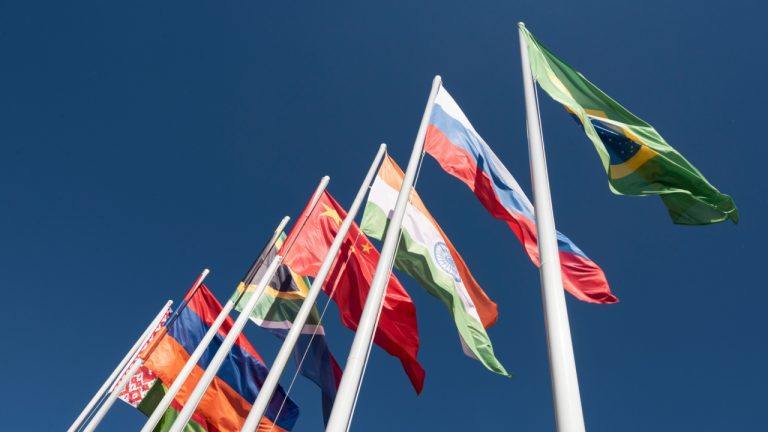 BRICS is gaining global traction, with plans for major 2025 meetings under Brazil’s leadership and a vision to rival G20 prominence while championing collaboration. BRICS Rising: Is It Set to Eclipse the G20 in 2025? Brazilian Foreign Minister Mauro Vieira has highlighted the growing influence of BRICS, stating that the group is approaching the stature […]
BRICS is gaining global traction, with plans for major 2025 meetings under Brazil’s leadership and a vision to rival G20 prominence while championing collaboration. BRICS Rising: Is It Set to Eclipse the G20 in 2025? Brazilian Foreign Minister Mauro Vieira has highlighted the growing influence of BRICS, stating that the group is approaching the stature […] The rapid rise of BRICS is challenging the relevance of the G20 as a global platform, with BRICS nations now surpassing the G7 in economic output. As BRICS gains influence, discussions about reforms to major international organizations, including the IMF and UN, are intensifying. According to an expert, the G20’s future is increasingly uncertain as […]
The rapid rise of BRICS is challenging the relevance of the G20 as a global platform, with BRICS nations now surpassing the G7 in economic output. As BRICS gains influence, discussions about reforms to major international organizations, including the IMF and UN, are intensifying. According to an expert, the G20’s future is increasingly uncertain as […]

The Bank for International Settlements and the Financial Stability Board have similar views on tokenization — it could provide new benefits and familiar challenges.
The Bank for International Settlements (BIS) and the Financial Stability Board (FSB) have both released a series of papers ahead of the Group of 20 (G20) Finance Ministers and Central Bank Governors meeting on Oct. 23 and 24.
Brazil is the president of the G20 world’s largest economies for 2024 and, like India last year, it called for a discussion of digital currency.
Both the BIS and FSB released papers on tokenization on Oct. 22. Although their studies were carried out independently, the BIS and FSB emphasized common themes.
 New data shows that 134 countries, representing 98% of global GDP, are now exploring central bank digital currencies (CBDCs), with 66 nations advancing to pilot or development stages. Every G20 nation is engaged in CBDC efforts, with notable leaders such as China and the European nations pushing forward. The U.S. remains lagging behind Europe and […]
New data shows that 134 countries, representing 98% of global GDP, are now exploring central bank digital currencies (CBDCs), with 66 nations advancing to pilot or development stages. Every G20 nation is engaged in CBDC efforts, with notable leaders such as China and the European nations pushing forward. The U.S. remains lagging behind Europe and […] The Indian government, through a panel headed by the Secretary of the Department of Economic Affairs (DEA), is expected to release a consultation paper on cryptocurrency regulations. The paper, scheduled for release between September and October 2024, will seek input from stakeholders to gather feedback on effective regulation. India is emphasizing the importance of international […]
The Indian government, through a panel headed by the Secretary of the Department of Economic Affairs (DEA), is expected to release a consultation paper on cryptocurrency regulations. The paper, scheduled for release between September and October 2024, will seek input from stakeholders to gather feedback on effective regulation. India is emphasizing the importance of international […] Indian Finance Minister Nirmala Sitharaman advocates for global consensus on cryptocurrency regulation, highlighting the need for international cooperation, particularly within the G20. She noted that while Indian regulators have differing opinions regarding how to treat crypto, there is currently no significant confusion. Indian Finance Minister on Crypto Regulation Indian Finance Minister Nirmala Sitharaman stressed the […]
Indian Finance Minister Nirmala Sitharaman advocates for global consensus on cryptocurrency regulation, highlighting the need for international cooperation, particularly within the G20. She noted that while Indian regulators have differing opinions regarding how to treat crypto, there is currently no significant confusion. Indian Finance Minister on Crypto Regulation Indian Finance Minister Nirmala Sitharaman stressed the […] The Securities and Exchange Board of India (SEBI) has submitted its recommendations for regulating crypto assets to a government panel. SEBI suggests multiple regulators for different aspects of cryptocurrency trade. India’s central bank, the Reserve Bank of India (RBI), however, views crypto as a macroeconomic risk, highlighting concerns about tax evasion and fiscal stability. SEBI […]
The Securities and Exchange Board of India (SEBI) has submitted its recommendations for regulating crypto assets to a government panel. SEBI suggests multiple regulators for different aspects of cryptocurrency trade. India’s central bank, the Reserve Bank of India (RBI), however, views crypto as a macroeconomic risk, highlighting concerns about tax evasion and fiscal stability. SEBI […] Indian Finance Minister Nirmala Sitharaman has stated that it is the position of the Indian government that crypto assets cannot be currencies, which are issued by central banks. She clarified that crypto assets can be used for trading, speculation, profit-making, and various other purposes. Moreover, she noted that India has raised the issue of crypto […]
Indian Finance Minister Nirmala Sitharaman has stated that it is the position of the Indian government that crypto assets cannot be currencies, which are issued by central banks. She clarified that crypto assets can be used for trading, speculation, profit-making, and various other purposes. Moreover, she noted that India has raised the issue of crypto […]
The Group of Twenty accepted the regulatory roadmap proposed in a joint Synthesis paper of the International Monetary Fund and the Financial Stability Board in September.
On Oct. 13, the Group of Twenty (G20), an international forum for the governments and central banks of countries with developed and developing economies, unanimously adopted the G20 Finance Ministers and Central Bank Governors Communique during its meeting in Marrakesh, Morocco.
Regarding crypto, the G20 accepted the regulatory roadmap proposed in a joint Synthesis paper of the International Monetary Fund (IMF) and the Financial Stability Board (FSB) in September. As the G20 statement goes:
“We call for swift and coordinated implementation of the G20 Roadmap, including implementation of policy frameworks; outreach beyond G20 jurisdictions; global coordination, cooperation and information sharing; and addressing data gaps.”
The IMF-FSB Synthesis Paper advocates for comprehensive supervisory oversight of crypto instead of a blanket ban. Its high-level recommendations include cross-border cooperation and information sharing between regulators, a demand for comprehensive governance and risk management frameworks for crypto companies, and a guarantee of access to relevant data provided by companies to the authorities.
Related: G20 nations reaffirm responsible use and development of AI technology
According to the Paper, the first review of the proposed measures' implementation status should happen by the end of 2025.
In October, the IMF published another working paper titled “Assessing Macrofinancial Risks from Crypto Assets.” Within it, the IMF researchers propose a crypto-risk assessment matrix (C-RAM) for countries to spot indicators and triggers of potential risks in the sector.
Regulators worldwide have been calling for a global framework on crypto recently. Mário Centeno, the governor of Banco de Portugal, urged for international cooperation to set up a “robust framework” and avoid the possibility of “regulatory arbitrage.” Roughly the same sentiment was expressed by the executive director of strategy, policy and control at the German Federal Financial Supervisory Authority, who prompted about the inconsistencies existing on a global scale.
Magazine: The Truth Behind Cuba’s Bitcoin Revolution: An on-the-ground report

The G20 member nations recommended addressing existing concerns around data protection, biases, appropriate human oversight, and ethics to ensure the responsible use and development of AI.
As India handed over the G20 Presidency to Brazil, the member nations have committed to harnessing artificial intelligence (AI) technology in a responsible manner in addition to planning for a future involving crypto assets and central bank digital currencies (CBDC).
The G20 leader’s declaration document highlighted technology’s role in bridging digital divides globally. In doing so, it acknowledged G20’s interest in curating policies and regulations for cryptocurrencies and the potential of CBDCs in cross-border payments.

The members of the G20 — which include Argentina, Australia, Brazil, Canada, China, France, Germany, India, Indonesia, Italy, Japan, Republic of Korea, Mexico, Russia, Saudi Arabia, South Africa, Turkey, the United Kingdom, the United States and the European Union — see AI as a tool for prosperity and expansion of the global digital economy.
“It is our endeavor to leverage AI for the public good by solving challenges in a responsible, inclusive and human-centric manner, while protecting people’s rights and safety.”
However, to ensure the responsible use and development of AI, the G20 member nations recommended addressing existing concerns around data protection, biases, appropriate human oversight, and ethics to name a few. The G20 nations’ AI “for good and for all” commitment read:
“To unlock the full potential of AI, equitably share its benefits and mitigate risks, we will work together to promote international cooperation and further discussions on international governance for AI.”
In addition, the members reaffirmed their commitment to G20 AI Principles, drafted in 2019, which details global policies and cooperation around building “trustworthy AI.” The G20 also agreed on taking a “pro-innovation regulatory/governance approach” that can help reap the maximum benefits of AI while potentially mitigating any associated risks.
The drive to build responsible AI will also aim to achieve the 17 Sustainable Development Goals (SDGs) set by the United Nations (UN) to further peace and prosperity around the world.
Related: G20 moves forward with international crypto framework
India’s Minister of Finance Nirmala Sitharaman confirmed that G20 members are working toward establishing a global crypto framework.

During the summit, Sitharaman highlighted the need for global cooperation to help regulate cryptocurrencies worldwide.
“In an interconnected world, financial technology transcends borders, therefore making cross-border partnerships absolutely crucial,” she concluded.